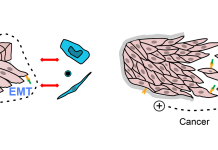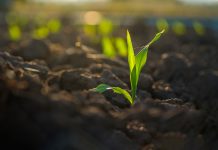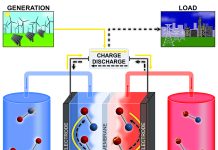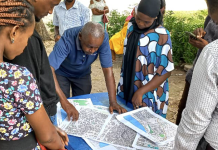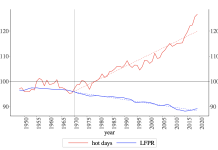Open Access Government produces compelling and informative news, publications, eBooks, and academic research articles for the public and private sector looking at health, diseases & conditions, workplace, research & innovation, digital transformation, government policy, environment, agriculture, energy, transport and more.
Home 2025
Archives
Cancers are like wounds because they are damaged tissue
Cancers resemble wounds. The question is why, and what does this mean? Many features of cancers – the so-called ‘Hallmarks of Cancer’ – may be mostly a wound-healing response. Dr Paul Edwards, Emeritus Reader at the University of Cambridge explores.
Next-generation exercise analysis technology: Visualization of muscle activity
Professor Yoshihiro Shimomura from Chiba University explores next-generation exercise analysis technology, using electromyography (EMG) and mechanomyography (MMG). His vMMG system visualizes muscle activity with a low-frequency microphone and LED indicators, enabling real-time observation and data recording for further analysis of muscle function.
Mathematical literacy and ICT integration research in particular real-world problem-solving in education
Professor Goto Joji, an expert in mathematics education, emphasizes the need for university-level mathematics education to develop essential skills in probability, statistics, and functional reasoning, highlighting its relevance to real-world problem-solving and everyday life.
SoilTribes: Glocal ecosystems restoring soil values, roles and connectivity
This analysis explores how creativity, knowledge-sharing, and the empowerment of local communities can transform our understanding of soil value and protection, focusing on global and local ecosystems that restore soil’s values, roles, and connectivity.
Menstruation – The female research advantage
While funding organizations are increasingly mandating equal representation of sexes and genders in research, hormonal fluctuations are still often viewed as complicating factors. Professor Belinda Pletzer argues for a shift in perspective, suggesting that the menstrual cycle should not be seen solely as a complicating factor, but as one of many variables influencing research.
A crisis in STEM education: We must fund STEM education research focused on interdisciplinary...
Reductions in STEM education funding occur at a crucial time when interdisciplinary problem-solving is vital for innovation. Nancy Butler Songer highlights the importance of Iterative Science and Engineering (ISE) programs, where students engage in cycles of designing and testing solutions to regional problems.
The left atrial appendage arrhythmogenic and thrombogenic substrate
The left atrial appendage (LAA) is a significant source of strokes in patients with atrial fibrillation (AF). Helena Dominguez from the Department of Cardiology at the University of Copenhagen discusses the LAACS studies, which investigate the effects of LAA exclusion during heart surgery.
Modeling and mapping forest carrying capacity
Mark Kimsey, Director of the Intermountain Forestry Cooperative, discusses the modeling and mapping of forest carrying capacity, beginning with the historical context.
Online and on-demand teaching materials for science education
Masatsugu Taneda, an Associate Professor at Osaka Kyoiku University, focuses on science education, in particular, the development of online and on-demand teaching materials, including chemistry.
An organic battery to power the future
Jolt has developed novel organic batteries that could foster the widespread adoption of renewable energy sources for electricity generation.
Semi-synthetic cannabinoids: A potent concern
Semi-synthetic cannabinoids have recently emerged as ‘lighter’ or ‘legal’ alternatives to cannabis, but they may be equally potent and equally risky, younger cousins.
Filicide: Hope for the future
Research shows that health and welfare services are key in preventing filicide. Thea Brown, Professor Emeritus at Monash University, highlights the need for improved training and education on this issue.
Empowering communities through citizen science: Redefining prosperity in Tanzania
The Citizen Prosperity Index offers essential data for effective policymaking and community action, aligning with global development goals focused on community empowerment and sustainable growth, key priorities for organisations like the UNDP.
Early intervention in the treatment of people with eating disorders
Tracey Wade from Flinders University highlights the benefits of early interventions for eating disorders. She notes that brief interventions during waiting periods can boost treatment completion rates, and early symptom improvements can lead to better outcomes.
Microalgae as a novel, non-animal source of long-chain omega-3 fatty acids and vitamin D
Charlotte Jacobsen and Emil Gundersen from the National Food Institute at the Technical University of Denmark emphasize the need for new plant-based sources of omega-3 fatty acids and vitamin D3, highlighting microalgae as a promising option and discussing the challenges in harnessing it.
The role of research and knowledge creation in decolonization
Geraldine Balzer from the University of Saskatchewan emphasizes the importance of reciprocity and relationality in research with Indigenous communities, advocating for collaborative knowledge generation that respects community values and involves extended engagement.
Permafrost resilience in the era of climate change and Earth system modeling
In this analysis from Everest Group, explore the resilience of permafrost in the context of climate change and earth system modeling, with an emphasis on how science and technology are enhancing Arctic stability and global risk management.
The decline of volunteering in the U.S explained
Rebecca Nesbit, Ph.D. from the University of Georgia, and Laurie E. Paarlberg, Ph.D. from Indiana University – Indianapolis, initiate a discussion on the decline of volunteering in the United States. They emphasize the significance of this trend and suggest ways to address it.
Climate change and the rise of adult male dropouts
Masahiro Yoshida from Waseda University’s Department of Political Science and Economics explores the link between global warming and male labor force participation.
Male victims of intimate partner violence: Insights from twenty years of research
Denise A. Hines, Ph.D., Enochs Endowed Professor of Social Work at the College of Public Health, George Mason University, explores the often-overlooked issue of male victims of intimate partner violence (IPV).

